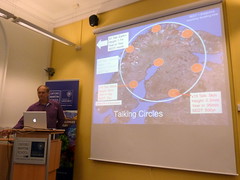July 22, 2012
Strangeness rules!
 Anders Sandberg on Singularity 1 on 1: Embrace Strangeness - a podcast interview about transhumanism, enhancement and how to handle the tensions inherent in a world where some people are changing in a posthuman direction.
Anders Sandberg on Singularity 1 on 1: Embrace Strangeness - a podcast interview about transhumanism, enhancement and how to handle the tensions inherent in a world where some people are changing in a posthuman direction.
July 19, 2012
More Australian TV
Artificial Irrelevance: The robots are coming | SBS World News. Covers the robotics conference last week, interviews Jaan Tallinn and me about risks of superintelligence.
My core point is that slow technological singularities are preferrable to fast ones, but we do not currently know 1) if singularities can happen, 2) what constraints there are on their speed, and 3) how to nudge them. More research is needed. Meanwhile the robots keep coming.
A world of Arguses
 With great documentary power comes great responsibility | Practical Ethics - my take on the altercation between professor Steve Mann and some McDonald's people in Paris.
With great documentary power comes great responsibility | Practical Ethics - my take on the altercation between professor Steve Mann and some McDonald's people in Paris.
Sousveilance might be a way of maintaining transparency in an open society, but it does have interpersonal costs. Just as surveilance can have chilling effects on expression and behavior, sousveilance might also cause it. This would tend to lead to an arms race where we all document each other, but it does not produce a situation equivalent to the non-documented starting state.
A superhuman exhibition
 Yesterday I attended the opening of the Wellcome Collection Superhuman exhibition in London. It is a wonderful combination of objects, art and debate. Everything from ancient Egyptian prosthetics to autonomous wheelchairs to comicbooks to transhumanist timelines.
Yesterday I attended the opening of the Wellcome Collection Superhuman exhibition in London. It is a wonderful combination of objects, art and debate. Everything from ancient Egyptian prosthetics to autonomous wheelchairs to comicbooks to transhumanist timelines.
In particular I was fond of Revital Cohen's "The Immortal", a set of life support machines linked together to support... nothing in particular. I was reminded by Monty Python's sketch "the little machine that goes 'bing'". But there is also a kind of elegant purity to the devices. They form a closed system, circulating matter and energy perfectly without the disturbing presence of a suffering messy patient. In a sense this might be what some of us would like to aspire to: to become something equally pure, quiet and self-contained. Superhuman by being purely posthuman.
 There is also an installation with enhancement experts monologuing about being superhuman. Everybody makes sense except maybe for that crazy Swede...
There is also an installation with enhancement experts monologuing about being superhuman. Everybody makes sense except maybe for that crazy Swede...
(The cool thing is that since that recording is part of the exhibition I can now honestly claim to be part of the Wellcome Collection - together with the medieval surgical instruments, Victorian quack medicine, creepy biological samples, and hightech artworks. Yay!)
July 11, 2012
Birthday among the robots
 Today is my 40th birthday. Or it will be... since 8.00 Swedish time is still ahead of the Sydney time I am on. And thinking like that, doubts soon creep in due to leap years, leap seconds and the complexities of Earth's orbit: is the birthday defined relative to the planet crossing a particular line from the sun to Earth set at the birth moment, when the right spot is turned towards the sun at the right angle, or just a social convention?
Today is my 40th birthday. Or it will be... since 8.00 Swedish time is still ahead of the Sydney time I am on. And thinking like that, doubts soon creep in due to leap years, leap seconds and the complexities of Earth's orbit: is the birthday defined relative to the planet crossing a particular line from the sun to Earth set at the birth moment, when the right spot is turned towards the sun at the right angle, or just a social convention?
In any case I am attending the 2012 Robotics Science and Systems Conference. I am having great fun, despite jetlag, exhaustion and a case of the cold. See the papers presented - everything from rocket propelled insects to applied differential geometry. SLAM, optical flow, biomimetic robots, swarming quadcopters and 3D cameras galore.
I gave a talk on The Robot and the Philosopher: charting progress at the Turing centenary. My point is that philosophy and robotics are intimately connected and can help each other a lot. Not just in terms of robot ethics, but also in solving deeper problems in philosophy and robotics.
 I have also been all over the media: yesterday ABC and SBC interviewed me (about robotics risks and transparency) - see the the ABC show here. Today I will be on ABC The Drum and later ABC radio's Late Night Live (with Jaan Tallin).
I have also been all over the media: yesterday ABC and SBC interviewed me (about robotics risks and transparency) - see the the ABC show here. Today I will be on ABC The Drum and later ABC radio's Late Night Live (with Jaan Tallin).
In any case, official birthday party in Sweden will follow when I get there, likely one of the days of August 4-5. Until then I regard myself as 39. Or 0.39 centuries old.
Personally I think the Harbour Bridge is much cooler engineering than the Sydney Opera House.
July 08, 2012
Love (enhancement paper) is here!
 Brian D. Earp, Anders Sandberg and Julian Savulescu, Natural Selection, Childrearing, and the Ethics of Marriage (and Divorce): Building a Case for the Neuroenhancement of Human Relationships, Philosophy & Technology, 2012, DOI: 10.1007/s13347-012-0081-8
Brian D. Earp, Anders Sandberg and Julian Savulescu, Natural Selection, Childrearing, and the Ethics of Marriage (and Divorce): Building a Case for the Neuroenhancement of Human Relationships, Philosophy & Technology, 2012, DOI: 10.1007/s13347-012-0081-8
Yes, our new paper on the neuroenahancement of love (for the sake of the children) is online and open access.
We argue that the fragility of contemporary marriages—and the corresponding high rates of divorce—can be explained (in large part) by a threepart mismatch: between our relationship values, our evolved psychobiological natures, and our modern social, physical, and technological environment. “Love drugs” could help address this mismatch by boosting our psychobiologies while keeping our values and our environment intact. While individual couples should be free to use pharmacological interventions to sustain and improve their romantic connection, we suggest that they may have an obligation to do so as well, in certain cases. Specifically, we argue that couples with offspring may have a special responsibility to enhance their relationships for the sake of their children. We outline an evolutionarily informed research program for identifying promising biomedical enhancements of love and commitment.
July 04, 2012
Gamers, neurons and how to map brains
Sebastian Seung gave a talk here at FHI a few weeks ago. Here is a recording: Sebastian Seung on connectomes, slicing neurones, retinas, and gamers - YouTube. (the Q&A-session)
Some very interesting ideas here about how to bootstrap the necessary computer vision methods to handle the imminent flood of connectomics data. As a computational neuroscientist I'm itching to take these reconstructed neurons and turn them into neural networks just to see what happens.
July 03, 2012
Brain emulation economics 101
 Robin Hanson gave an interesting talk at FHI a while ago about the economic impact of brain emulation. His basic approach is to look at what follows from assuming copyable human-based software entities. The answer is that it would be a big deal both in terms of economics, social change and the human condition.
Robin Hanson gave an interesting talk at FHI a while ago about the economic impact of brain emulation. His basic approach is to look at what follows from assuming copyable human-based software entities. The answer is that it would be a big deal both in terms of economics, social change and the human condition.
One of my friends is a bit unhappy with the scenario (since it involves a lot of disposable versions of people being deleted, Malthusian competition, extreme inequality etc.), so he wrote a post and started a debate about it on Less Wrong.
My own take on the talk is that it is a first order approximation. I think there will be plenty of complicating factors. But figuring out what those are and why they are strong enough to withstand the logic of Robin's arguments is going to be a fun challenge.
I think any form of cheaply copyable human capital - whether AI, uploads, downloadable skills or super-schooling - will lead to an economic singularity. So watch out for any trends moving us closer to such technologies.